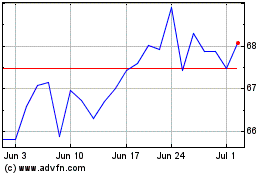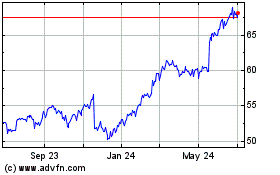Tesco Pulls Unilever Products From Online Site
October 12 2016 - 6:20PM
Dow Jones News
LONDON—Tesco PLC, Britain's largest grocer, pulled products made
by Unilever PLC, the world's second-largest consumer goods
producers, from its online shopping site because of a dispute over
pricing in the wake of the pound's sharp descent, according to a
person familiar with the matter.
The high-profile spat between two of Britain's biggest and
best-known corporations threatens to move the debate over the
economic ramifications of Brexit from the halls of parliament to
the kitchen table. In recent weeks, amid a sharp selloff of the
British pound following the June 23 vote by Britons to leave the
European Union, many retailers of imported products—including wine,
electronics and cars— have raised prices.
But Tesco's decision threatens to bring the reality of the
pound's diminished buying power overseas into much sharper focus
for consumers of big-name Unilever brands like Ben & Jerry's
ice cream, Marmite spreads and Dove deodorants.
Unilever had demanded Tesco raise prices on a range of its
goods, saying they rely on imported ingredients, priced in dollars
and euros, according to a person familiar with the matter. Tesco's
Chief Executive Dave Lewis, a former Unilever executive, refused to
do so, leading to the standoff, this person said.
"We are currently experiencing availability issues on a number
of Unilever products," said a Tesco spokesman. "We hope to have
this issue resolved soon." Unilever declined to comment.
Unilever has also approached J Sainsbury PLC, Britain's second
largest grocery chain, to ask for price increases of 10% on average
on all its products, according to a person familiar with those
conversations. Sainsbury is still in discussions with Unilever,
according to this person.
The pound has fallen sharply since the summer Brexit vote. Late
Wednesday, it was trading down 0.02% on the day, and down more than
15% from it high on June 23, the day of the vote. It plumbed
three-decades lows against the dollar last week. On Wednesday, it
touched an all-time low against a basket of global currencies that
the Bank of England has tracked since the 1970s.
Economists have been warning for months about the threat of
higher consumer prices because of imported inflation related to the
pound's depreciation. Import prices surged 9.3% in August,
according to Britain's statistics agency.
But higher prices can take some time to trickle down to
consumers. Many manufacturers, protected by comfortable margins or
in an effort to defend market share, will endure the lost revenue
caused by such currency related price moves. Luxury goods makers,
for instance, have been slow to raise prices in Britain so far.
Many importers and manufacturers that depend on foreign input
costs, meanwhile, hedge currency exposure. Those hedges, though,
don't last forever. As they expire, companies have to decide
whether or not to raise prices.
Tesco's move also marks an unusually public fight between two of
Britain's best-known companies. Tesco, in addition to being
Britain's biggest grocer, competes with France's Carrefour SA, as
the world's second largest retailer behind Wal-Mart Stores Inc.
Unilever, an Anglo-Dutch firm with corporate headquarters in
London, is the world's second largest consumer goods company behind
Procter & Gamble Co.
Mr. Lewis, Tesco's CEO, is a longtime Unilever executive, who
previously headed the consumer goods company's personal care
division and was widely seen as a strong candidate to replace
Unilever CEO Paul Polman.
Under Mr. Lewis, Tesco has been working hard to stem market
share losses to discounters, like German chains Aldi and Lidl,
which have moved into Britain aggressively, consistently offering
bargain prices, including in some cases on branded products. Among
other initiatives, Mr. Lewis has cut everyday prices by 6% and
launched a range of lower-priced products in a bid to stave off
further share losses.
Write to Saabira Chaudhuri at saabira.chaudhuri@wsj.com
(END) Dow Jones Newswires
October 12, 2016 18:05 ET (22:05 GMT)
Copyright (c) 2016 Dow Jones & Company, Inc.
Walmart (NYSE:WMT)
Historical Stock Chart
From Mar 2024 to Apr 2024

Walmart (NYSE:WMT)
Historical Stock Chart
From Apr 2023 to Apr 2024
